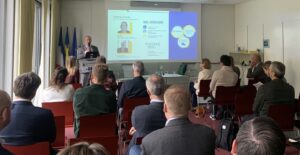SHC organized a conference together with FEDENE on the subject of carbon-neutral DHC in Sweden and France • FEDENE’s latest survey reveals opportunities and challenges in French DHC networks • Amiens heating network has signed a partnership agreement for a biomass boiler run on green waste • Read more about the developments in sustainable heating and cooling in this month's news update from the UK

On November 28, representatives from Sweden and France’s heating and cooling sectors met at the Embassy of Sweden in Paris for a conference organized by SHC by Sweden in collaboration with the French industry association FEDENE. The event, titled “The Road to Carbon Neutral Heating in Europe; Approaches from France and Sweden”, delved into key aspects of sustainable heating and cooling. With a thematic focus on “Network Efficiency” and “Energy Transition, Biomass, and the Future Stakes of Bioenergy,” the conference provided a platform for in-depth discussions and business dialogues.
Bringing together key stakeholders from both public and private sectors in France and Sweden, the conference served as a dynamic forum to explore the future of district heating and cooling networks in both countries within the broader European context. 40 representatives from Swedish and French organizations actively participated in the conference and an ensuing networking lunch at the Ambassador’s residence, engaging in conversations about the challenges and opportunities inherent in achieving carbon-neutral heating and cooling.
The proceedings commenced with introductory speeches by Marie Eck from Business Sweden and Pascal Guillaume from FEDENE, setting the tone for the event. H.E. Ambassador Håkan Åkesson also delivered a welcoming address, underscoring the context of the conference and the significance of holding these discussions. Furthermore, the conference featured four distinguished keynote speakers, each representing prominent entities from France and Sweden such as Öresundskraft, CCIAG, Dalkia, and Göteborg Energi. The ensuing panel discussions also brought together experts from Energy Opticon, CarboSeal, NODA, MEVA Energi, and Jord, contributing to a comprehensive exploration of the landscape of sustainable heating and cooling solutions in France and Sweden.
Several success factors were elaborated on during the keynote speeches and panel discussions. On the policy side, the conference raised questions about national and EU regulation that would be beneficial for carbon-neutral development for district heating networks and biomass heat generation, with several French and Swedish actors voicing similar concerns and wishes for a change in the policy landscape towards a simpler and more stabilized EU framework. Simplicity was also a common theme in discussions pertaining to DHC solutions; several actors touched upon the benefit of pursuing simple and scalable software solutions for making sense of data captured in district heat networks. Another theme raised in the context of software and network management was how to become more proactive in optimization measures. Several participants showcased examples of how to use machine-learning and simulation to not only act on changes in weather, demand or supply conditions in real time, but also act proactively.
Panelists also discussed how to take a systemic approach to network efficiency while also integrating the best independent solutions available in the market; from hardware used to capture data in the district heating system, to software used to optimize generation and energy-efficient distribution, as well as new development of biomass and potential solutions for performing preventive maintenance in inaccessible areas. In this spirit, several participants also showcased examples where they in fact used technologies proposed by other participants present at the conference. The event thus showcased examples of how the road to carbon-neutral heating can be achieved by collaborating, sharing best-practices, and exploring innovative solutions together.
In November, FEDENE published this year’s edition of the annual survey of French district heating and cooling networks. Every year, FEDENE, the leading union of public and private heating and cooling network operators, carries out a comprehensive survey of heating and cooling networks. The national survey is regarded as one of the main sources of exhaustive information on DHC networks in France, and is conducted with the support of AMORCE, a national network of local authorities and local actors committed to the ecological transition, and under the supervision of the Data and Statistical Studies Service (SDES) of the Ministry of Energy Transition.
The survey shows that heating accounts for the largest share of energy use in France today, ahead of transport and other specific uses of electricity; three-quarters of the energy consumed in a French home is used for heating and hot showers. Since heat production still largely depends on imported fossil fuels, the heat market has become subject to the volatile prices in Europe during 2022. The survey shows that heating systems using a higher share of renewable contents saw greater stability in prices; showcasing synergies between ecological and economic benefits. For example, in 2022, more than 80 municipal swimming pools had to close due to high energy bills, largely due to a reliance on non-renewable energy sources with volatile prices.
With French district heating networks on average boasting a renewable energy content of 66% their advantages over competing heating solutions are clear. However, while the survey shows that France is indeed seeing an increase in the number of district heating networks, the increase will not be enough for France to meet its national targets of 2028.
Overall, there is also a need to densify networks by connecting more buildings. It is estimated that the new targets for 2030-2035 would require connecting 300,000 to 360,000 homes per year, compared to the current 160,000 per year. One of the technical solutions proposed by professionals in the sector is to accelerate the development of secondary hot water loops that would make it possible to connect buildings currently equipped with individual heating systems to existing networks. While this comprises a big challenge, evidence points to the fact that such an investment would make sense for consumers. According to a 2021 survey by Amorce, the heating and domestic hot water cost for a consumer connected to a district heating network is 20% cheaper compared to a gas boiler, 40% cheaper than an individual electric heating, and 50% cheaper than an oil boiler.
Read more in news article from Techniques de l’Ingénieur
The Amiens heating network is set to unveil its second biomass boiler room in 2025, marking a significant step forward in sustainable heating practices. This innovative facility, a collaborative effort between Semop Amiens Energies and Danish supplier Dall Energy, distinguishes itself by running entirely on 100% green waste—marking a successful cross-border collaboration between France and Nordic countries. The partnership agreement was formalized on November 14th during a day of bilateral exchanges between Denmark and Hauts-de-France, hosted at the Quai de l’Innovation and focused on the theme of district heating networks.
The location chosen for the new biomass boiler room is poised to connect to the network South University Hospital to the network. This development addresses not only the pressing need for enhanced heating infrastructure but also aligns with sustainability goals by relying exclusively on environmentally friendly energy sources. The initiative aims to contribute to the broader ecological transition in the region.
The envisioned expansion is ambitious, with plans to extend the network to a remarkable 75 kilometers by the target year 2025.
To stay updated on news for sustainable heating and cooling, follow us on LinkedIn, and subscribe to our Newsletter.
Sweden is at the forefront of decentralised heat networks technology. Our aim for “Sustainable Heating & Cooling by Sweden” is to facilitate knowledge sharing between British, French and Swedish stakeholders and develop and encourage environmental and economic best practice.
To find out how we can help you and your organisation, please contact our London or Paris-based “SHC” teams. We can introduce you to leading consultants, suppliers of technology and services who will be pleased to share know-how of the development of sustainable heating & cooling solutions.


